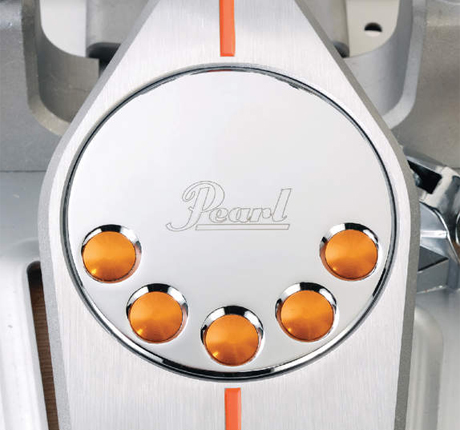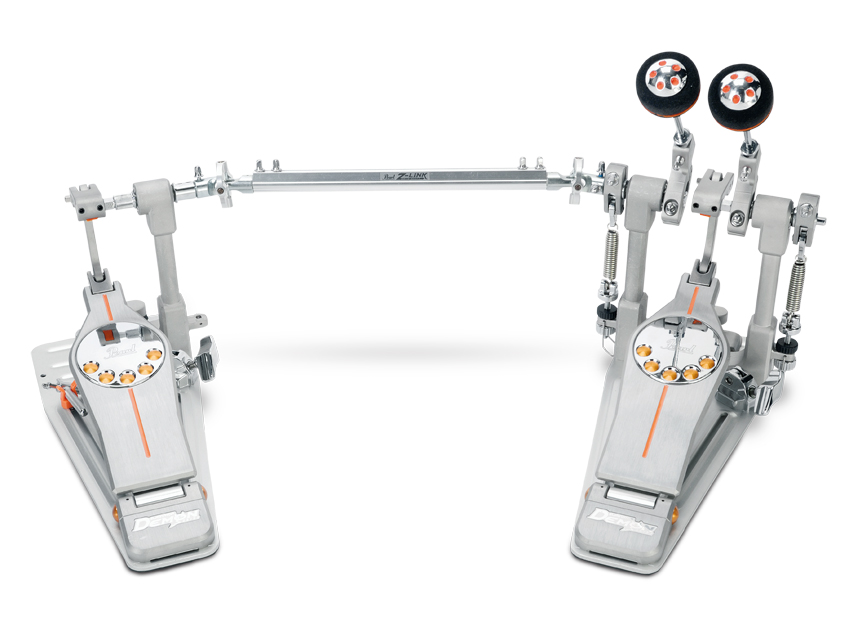MusicRadar Verdict
As each new generation emerges, with increasingly accurate skills, gear must keep pace. The Demon pedal is Pearl's comprehensive response to that challenge - adaptable, precise and mightily impressive - just be absolutely sure that direct drive really is the salvation you're looking for before shelling out.
Pros
- +
Sets a new benchmark in adaptability and precision. Amazing looks.
Cons
- -
Endless options = scary price tag.
MusicRadar's got your back
The Demon Drive (proudly on display at Winter NAMM 09) is a major departure from Pearl's previous chain - or strap-drive Eliminator. Chains have ruled the roost since the 1980s, but the big news is the Demon has a direct, rigid-link drive.
Yamaha and Gibraltar make cheaper, simpler direct drives around the £100 mark, but the pricey Demon is closer to the well-established Axis pedal from Axis Percussion.
"NiNjA bearings are top quality, supremely smooth Japanese skateboard bearings. They're micro-polished via a laser process, the same as used for satellite telescopes"
Build
The hi-tech orange and brushed aluminium image recalls the Axis or the extraordinary Trick Pro1-V, both of which have machined parts. The Demon is predominantly cast aluminium, but still looks strong and high quality. The footboard is aluminium but has a steel spine.
Where the Demon really scores is on versatility. It has three major new adjustment features. These allow you to move both the direct link and the beater stroke mechanisms closer to, or further from, the batter head - resulting in lighter or heavier feels - and also to change the footboard from traditional short (ie, with hinged heel plate) to long.
Working through all the permutations, that adds up to eight basic set-up options, something that no previous pedal has managed. And that's on top of the fine tuning, which is standard with most pedals (ie, spring tension plus length and angle of the beater stroke).
Added to this there's the silent, precise action due to the NiNjA bearings Pearl has shelled out on for the beater assembly. NiNjA bearings are top quality, supremely smooth Japanese skateboard bearings. They're micro-polished via a laser process, the same as used for satellite telescopes.
There are also self-aligning spherical bearings in the direct linkage, alleviating the stress caused by drummers who foot the board at an angle or rock side-to-side. Clever, huh? Another nice touch is the way the spring tension is locked in place by a clip so it can't vibrate loose.
Want all the hottest music and gear news, reviews, deals, features and more, direct to your inbox? Sign up here.
"This is not the sort of pedal you just grab and play. There's the little matter of eight basic settings to investigate"
The main and slave pedals are connected by a gleaming, gyroscopic Z-link drive shaft - 'Z' standing for zero tolerance, ie, no wobble or lag. Because the action is unforgivingly direct, the felt or wood beaters have shock-absorbing orange 'elasticore' innards. Elasticore is the same material used in golf clubs to cushion the blow.
Structurally ,the Demon's a single post, modular design, available as a single or double pedal, or a slave unit. If you buy a double, the left-side pedal can be adapted as a single pedal. So should you ever go the whole hog and get a second bass drum, you won't have to buy single pedals all over again. The modular design is completely flexible, so you can actually change a right-footed twin pedal to a left-footed twin, needing no extra parts.
Lastly, there's a compartmentalised carrying case in black fabric. Extras include NiNjA oil, Allen keys and special universal key. Because of the extensive use of aluminium the pedal and case are surprisingly lightweight.
Hands on
This isn't the sort of pedal you just grab and play. There's the little matter of eight basic settings to investigate. Luckily, swapping between light or heavy positions on the direct link drive and the beater shaft holder is simple, requiring a normal drum key and taking a matter of seconds. It's amazing, though, just how big a difference these options make to the feel.
The only option that takes time is changing the 'Duo-Deck' footboard from short to long, since this involves eight screws. But then, you'll probably only do this once or twice ever. The long board gives a slightly more sensitive and speedy feel.

The footboard has a set of five orange aluminium 'traction' dots - looking like an old fashioned telephone dial - and these too can be moved into different positions to give your foot grip where you need it most. What's more, the spots can be changed for rubber ones for extra friction.
So to the big question: what's it like to play? Well direct action is exactly the right description. It's almost like there's no board and your foot's making direct contact with the batter head. And the slave pedal really does feel exactly like the main pedal.
There's no lag or whip, everything moves with an eerie silence and friction-free smoothness. It's a similar sensation to that of the Axis. It's so 'transparent' you could say it lacks 'feel' in the way older strap/chain pedals had (good or bad) personality.
But this is a precision tool for an ultra-precise age. It takes getting used to and we spent hours trying to find the ideal set-up. As of writing we're still only 70 percent acclimatised, but that's more my fault than the Demon's.
